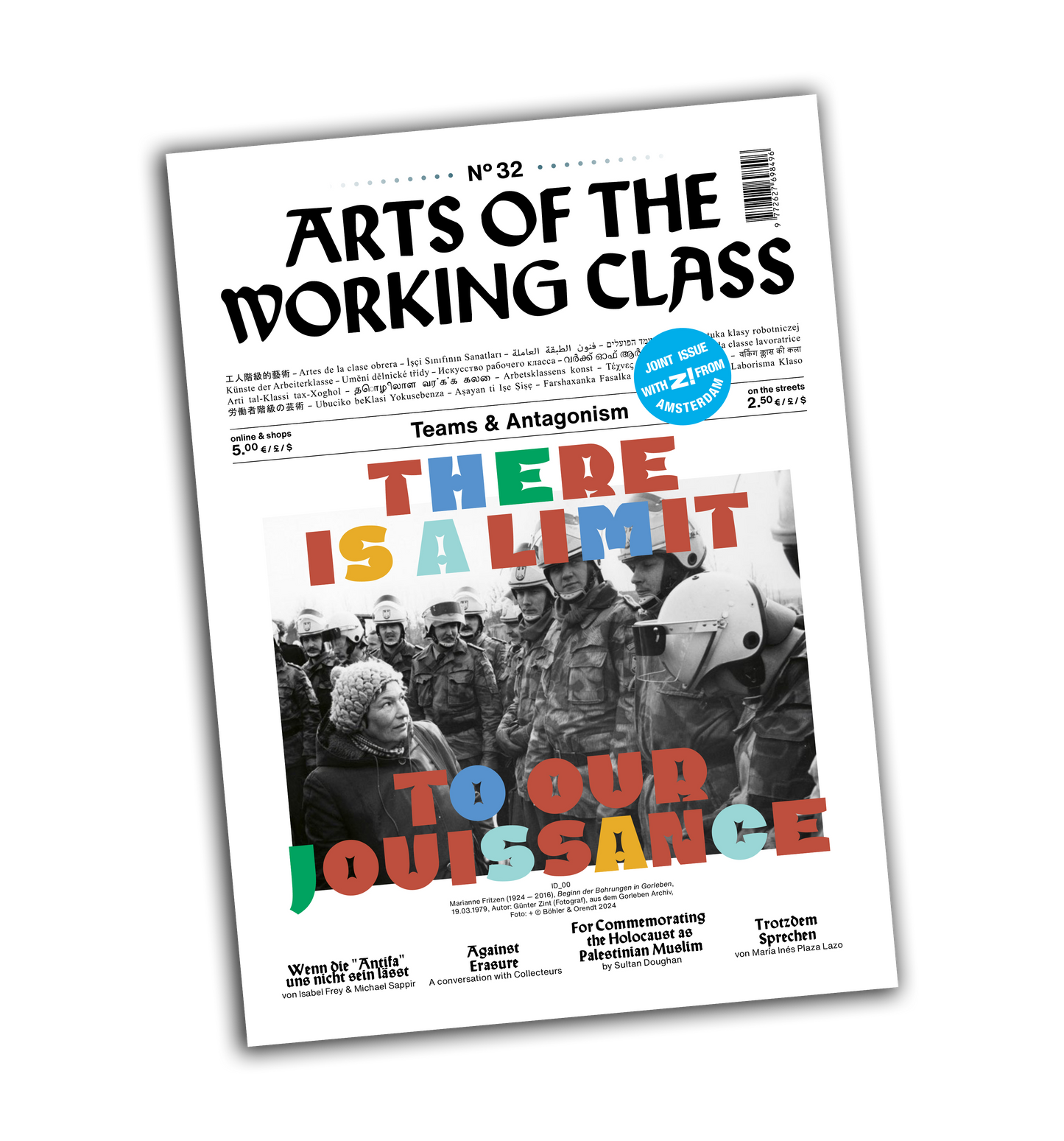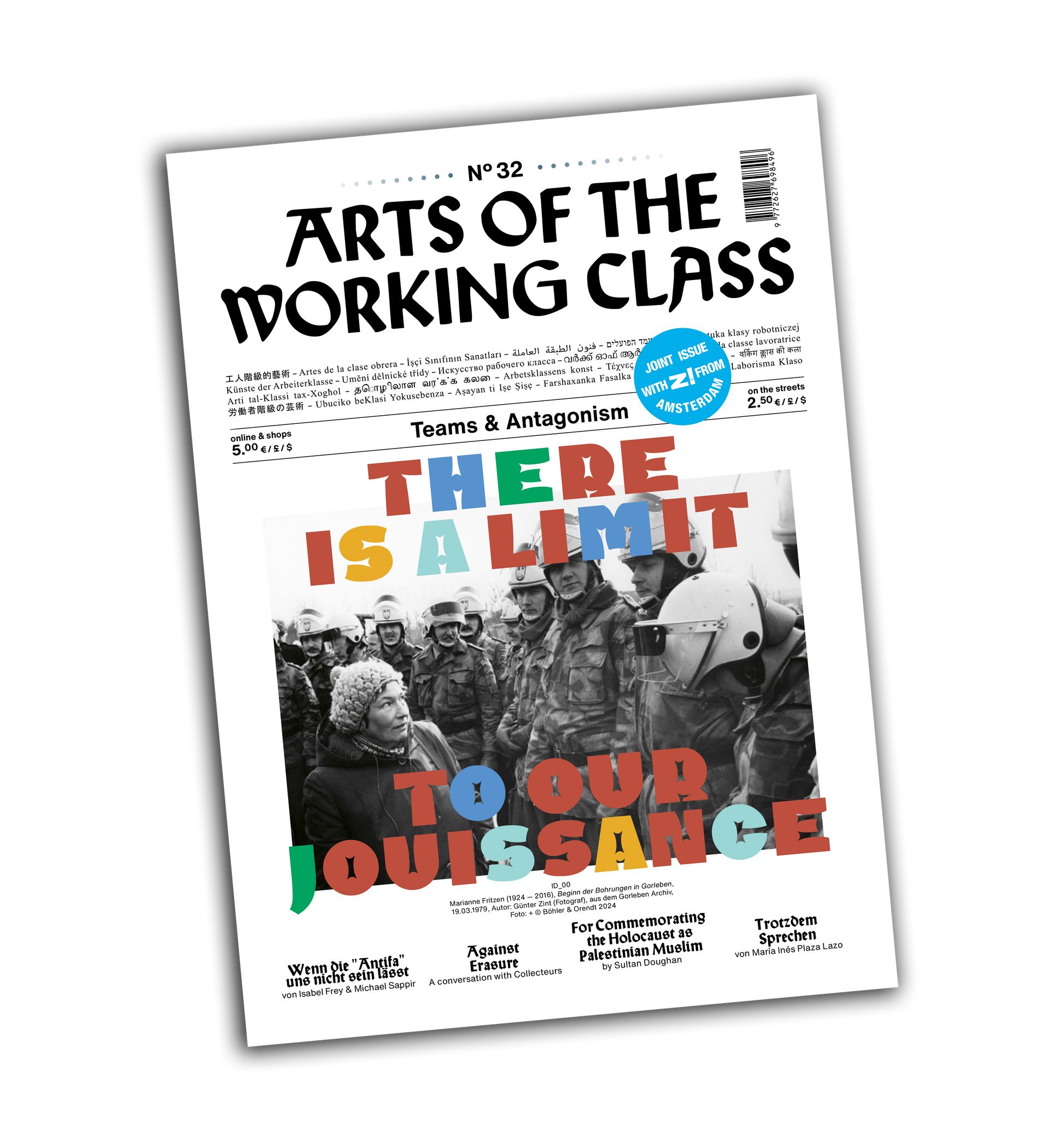Arts of the Working Class
ISSUE 32: TEAMS & ANTAGONISM
ISSUE 32: TEAMS & ANTAGONISM
Couldn't load pickup availability
What does the image of a Palestinian flag blowing at the Holocaust Memorial in Berlin trigger in you? Do you know where this feeling comes from? Have you thought about how this feeling it could be weaponized?
Our summer issue, Teams and Antagonisms, gazes into the eye of the storm and asks how we can stand by our positions in this match against the AfD and those who prefer to instrumentalize identities and narratives in search of the legal abuse of power. This issue’s articles reflect on how the genocide in Gaza is represented by right-wing politics at large. This issue shows how different our positions are towards this matter, questioning how the tools of liberation can be useful to a petit-bourgeois-working class (yes, you, potentially), exhausted and intimidated by the benevolent imperial surplus generator (aided by social media). It crystallizes how non-dogmatic we must be if we want to cut through the weapons deployed by state propaganda against the backdrop of the erasure of narratives, monopolization of memory, and the instrumentalization of both Jewish and Palestinian identities.
Building common ground is not a battle, but rather a game of negotiation. Manifesting a space to understand the decolonial struggles we are all enmeshed in can only be a joint venture. To accept the colonial privileges from which many of us benefit, and to change the attendant chain of oppressive dependency is part of the process. The current state of political divisions suggests that it is unclear to the majority of this society what this negotiation will entails, so let’s get to it, time is a luxury we don’t have.
This issue calls on everyone to participate in this negotiation, particularly encouraging those who thrive on polarization to explore the nuances and complexities that lie between the poles. Beyond this duality of heroes and villains, we have divided the issue playfully into two chapters being against and being for something to highlight that each position already contains the other, and is kept apart primarily by imperialist structures.
The narratives of this issue are held together by the artworks of Ahlam Shibli, Böhler & Orendt, Tarik Kiswan- son and Sarah Lucas, who hold the nuances of the struggles, underwrit- ten by class, gender, nation, and racial privilege, close. Agreeing to disagree is a prolonged match that may lead us to a different destination than where we thought we were going.
On the flip side of the issue is Z! - a companion street newspaper operating in the maze of Amsterdam’s streets and canals. This collaboration was facilitated and supported by Framer Framed, a platform for contemporary art, visual culture, and critical theory and practice in based Amsterdam. Framer Framed is concerned with its role in the social fabric of the city and the world. At different scales, this is another expression of our issue topic: how, and in which roles, do we facilitate each other's companionship, alliance, and camaraderie instead of engaging in empty antagonism and needless competition?
What is Jouissance?
Jouissance is a special word used by the psychoanalyst Jaques Lacan. It has something to do with the French term "jouir". In English, this means "to enjoy", but also "to have an orgasm". Jouissance is the feeling when the pleasure actually stops, but you carry on anyway. For example: When you can't stop playing a game on your cell phone. You play and play, even though you're already tired or hungry. Should we as a society actually stop playing against each other? The AWC editorial team is asking itself this question. After all, we have long since reached the limits of fun and are now only suffering. That's why we say on the cover: There is a limit to our Jouissance.
With contributions from Alon-Lee Green and Rula Daoo, DMT, Sultan Doughan, Kuba Szreder and the Center for Plausible Economies, Collecteurs, Joanna Warsza and Benjamin Foerster-Baldenius, Amelie Jakubek, Abolitionist Jelly, Tarik Kiswanson, María Inés Plaza Lazo, Sarah Lucas, Dalia Maini, CM, MS, Böhler & Orendt, Mohammad Salemy, Isabel Frey and Michael Sappir, Shibboleth, Ahlam Shibli, Labornet.tv, Danny Hayward and Marina Vishmidt, Huda Zikry, and Rico Zyrrano.
Imprint
Founders / Publishers / Directors
Verantwortlicher i.S.d . 18 Abs. 2 MStV
María Inés Plaza Lazo, Pauł Sochacki
Managing / Artistic Director
Amelie Jakubek
Editor in Chief
Dalia Maini
Editorial Assistance
Noa Jaari
Artistic Project Development & Distribution
Theresa Zwerschke
Administrative Assistance
Selma Louise Christoph
Proofreading
William Kherbek, Anne Waak
Graphic Design
Paul Sochacki / Manuel Bürger
Online Design
Giorgia Belotti
Voluntary support:
Mia Ribeiro Alonso, Annalisa Giacinti, Line Lange, Hassoumi Moctar Agali, Amina Zerourou, Ruslana Shabelnyk, Nina Abba, Hannah Lu Verse, anna zrenner, Sophie Franziska Schultz, Nadine Bajek, Cora Pagano, Yasemin Şenkal, Lukas Grube, Duarte Eduardo, Felix Dengg, James Rhys Edwards, Louisa Maria Stank, Sophie Hartleib, Teresa Mayr, Leo Baumgärtner, Katharina Thurow
Druck
A.Beig Druckerei und Verlag
GmbH & Co. KG
Damm 9-19
25421 Pinneberg
Alle Vertriebs- und Kund*innenanfragen an die Verlagsadresse
Reflektor Monde gUG (haftungsbeschränkt)
Lynarstrasse 38, 13353 Berlin
hey@artsoftheworkingclass.org
Arts of the Working Class can now be read digitally, too. Please find our vendors who carry a STREAD badge and you will be able to scan a code to digitally buy a copy and additionally the STREAD issue of each month.
Spendenkonto:
Reflektor Monde gUG
IBAN: DE64 1001 0010 0931 5031 07
BIC: PBNKDEFF
paypal: p@artsoftheworkingclass.org
Supported by: Vrienden Loterij Fonds


